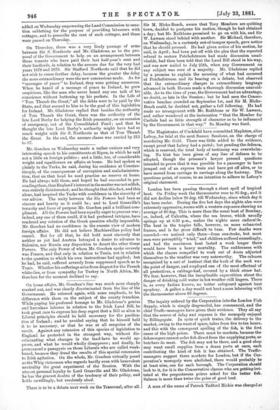Mr. Goschen on Wednesday made a rather curious and very
interesting speech to his constituents at Ripon, in which he said not a little on foreign politics ; and a little, too, of considerable weight and significance on affairs at home. He had spoken so plainly to the Turks, he said, during his residence at Constan- tinople, of the consequences of corruption and maladministra- tion, that on that head he need practise no reserve at home. He had always told them, and hoped he had succeeded in per- suading them, that England's interest in the matter was not selfish, was entirely disinterested; and he thought that this fact, and this alone, had inspired the Turks with confidence in the sincerity of our advice. The unity between the Six Powers had been as sincere and hearty as it could be ; and to Lord Granville's tenacity and force of purpose Mr. Goschen paid a brilliant com- pliment. All the Powers had been equally eager to prevent war; indeed, any one of them could, if it had preferred intrigue, have rendered any solution of the Greek question wholly impossible. Mr. Goschen had no confidence in the roseate view of modern foreign affairs. He did not believe Machiavellian policy had ceased. But for all that, he did hold most sincerely that neither as yet had Austria betrayed a desire to advance to Salonica, nor Russia any disposition to desert the other Great Powers. The only Power of whom Mr. Goschen spoke severely was France, and that only in relation to Tanis, not in relation to the question to which his own instructions had applied; but be had, he said, suffered severely from suppressed speech as to Tunis. Whether his sufferings arise from disgust for the French white-lies, or from sympathy for Turkey in North Africa, Mr. Goschen for the moment declined to say.


































 Previous page
Previous page